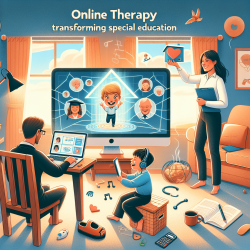Introduction
The COVID-19 pandemic has challenged many sectors, including education and community services. For practitioners in speech-language pathology and related fields, understanding how to adapt services to meet the needs of underserved populations, such as Latinx youth, is crucial. This blog explores insights from the research article "The Challenges and Opportunities of Sustaining Academia-Sponsored Community Service Programs for Latinx Youth During the COVID-19 Pandemic" and offers practical strategies for enhancing online therapy services.
Understanding the Challenges
The pandemic has exacerbated existing inequalities, particularly for Latinx youth, who face higher rates of poverty and limited access to resources. The transition to online learning and services has highlighted disparities in technology access and digital literacy. Practitioners must be aware of these challenges to effectively support Latinx youth in virtual environments.
Opportunities for Improvement
Despite these challenges, the pandemic has also presented opportunities to innovate and improve service delivery. The research highlights several key areas where practitioners can focus their efforts:
- Strengthening Partnerships: Collaborating with community organizations can enhance resource sharing and support for Latinx youth.
- Flexible Program Design: Adapting programs to be more flexible and customizable can ensure they remain relevant and effective in changing circumstances.
- Leveraging Technology: Utilizing technology to create engaging and interactive online sessions can enhance learning and participation.
Strategies for Effective Online Therapy
Based on the research findings, here are some strategies practitioners can implement to improve online therapy for Latinx youth:
- Enhance Digital Access: Ensure that all participants have access to necessary technology and provide training to improve digital literacy.
- Engage with Interactive Content: Use interactive tools and multimedia resources to make sessions more engaging and effective.
- Focus on Cultural Competence: Incorporate culturally relevant materials and activities to better connect with Latinx youth.
- Conduct Regular Assessments: Use assessments to evaluate program effectiveness and make necessary adjustments.
Encouraging Further Research
While the research provides valuable insights, there is still much to learn about the long-term impacts of online service delivery on Latinx youth. Practitioners are encouraged to engage in further research and share their findings to contribute to the growing body of knowledge in this area.
Conclusion
By understanding the challenges and opportunities presented by the pandemic, practitioners can enhance their online therapy services for Latinx youth. Implementing the strategies discussed can lead to more effective and equitable outcomes. To read the original research paper, please follow this link: The Challenges and Opportunities of Sustaining Academia-Sponsored Community Service Programs for Latinx Youth During the COVID-19 Pandemic.










